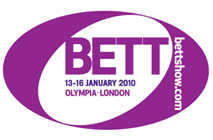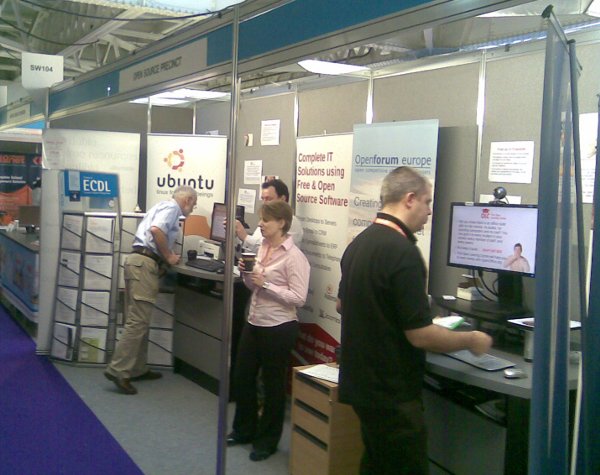BETT 2010 Review
 It’s that time of year when around 30,000 educationalists from all over the world descend on Olympia in London for the annual edu-geek-out that is BETT.
It’s that time of year when around 30,000 educationalists from all over the world descend on Olympia in London for the annual edu-geek-out that is BETT.
I’ve been going to BETT now for 3 or 4 years as an exhibitor or just helping to promote Open Source and Free Software with other like minded members of our amazing community.
This year we helped our friends and colleagues at Open Source Schools and Open Forum Europe on the Open Source Café. The simple objective of the show was to inform the education sector about Open Source and where to find help, advice and common ground with peers who’ve “been there” and “done that” already.
This year was, frankly, quite exceptional.
The stand received financial sponsorship from Red Hat, Linux IT, University of London Computing Centre and The Learning
Machine (Ingots) for which everyone is very grateful. Canonical, the commercial entity behind Ubuntu very kindly provided us with 600 Ubuntu 9.10 CDs (500 Desktop and 100 Server) to give away (thanks Larry) and there were a similar number of CDs containing a great collection of Education-centric Open Source desktop applications for Windows from Free Software for Students that was compiled and produced by Peter Kemp and David Wilmut. That’s around 1200 CDs in total full of completely Free goodness and fun. We encouraged all the recipients to copy, share and pass them on too! At the end of the show we had only a few (quite literally) of each remaining.
An interesting sum was carried out: The value of equivalent proprietary software was estimated to be over £4000 for the pair of CDs – I actually think that is rather low considering the volume of stuff in the Ubuntu repos including several real Enterprise grade applications such as OpenERP and Alfresco – so we have potentially delivered a net saving to the education sector of at least £2.5m. And of course this does not include all the free copies that will be made and passed around!
I noticed a real sea-change between this show and last year’s. I don’t actually recall speaking to one school or Local Authority this show that had no-idea of, or that wasn’t aware that they were using, Open Source Software. Most were really proud of their achievements, many were rolling out or had completed roll outs of OpenOffice.org rather than waste many thousands of pounds on unnecessary & proprietary Office Application Suite Licenses. Many more used and raved about Audacity – the ubiquitous audio capture and editing tool. No one I spoke with was reticent toward Open Source and many were keen to talk and share their experiences. This is what the Open Source Schools project is all about: using the principles of FOSS; of community, collaboration and sharing, and providing a location for this to happen. If you are involved in education and have any interest in Open Source, or even better are an expert, get involved and share your experience and knowledge gained.We also found time to meet up with friends and colleagues from Sirius, Mark Taylor and John Spencer. Sirius has been very successful in the education sector, they are the only Open Source vendor to be on Becta’s “approved supplier list”, and were nominated for an award this year for the work they and North West Learning Grid put in to the National Digital Resource Bank.
The national digital resource bank will deliver a vast range of publicly funded resources under a creative commons licence and populate your learning platforms, preparing them for effective use.
It will also create a sharing community of educators who will identify, review and improve a common set of national digital assets.
The world is really changing very fast. I go to parties and find people in all walks of life (i.e. not IT professionals) who are aware of Open Source, Governments are (some faster than others admittedly) waking up to the reality that FOSS provides significant benefits over proprietary software in many ways more than just money, and Enterprises are adopting not just Open Source Software but the principles behind it too to make their own businesses better.
BETT 2010 confirmed this trend in spades. Roll on BETT 2011.
Miles from Open Source Schools and one of the organisers of the event has also posted a review of the show that you can read here.
Number 10 Petition for FOSS in Schools
The title says it all, but just in case:
We the undersigned petition the Prime Minister to Make the primary operating system used in state schools free and open source.
Here’s the link: http://petitions.number10.gov.uk/nonMSschools/
2 Sore Feet, 200+ CDs, 400+ Teachers: BETT 2009
After having a bit of lay-in this morning (but not as long as I’d hoped for), I thought I should mention what we got up to at BETT last week.

Along with our friends at the OpenForum Europe and helpers from a few other Free Software or Open Source related organisations, we exhibited much of what it is best about FOSS to the international education community.

We had a couple of shiny new Samsung 2343BW widescreen monitors showing off Edubuntu/Ubuntu to full effect. There were a variety of sub-notebook class devices demonstrating various Free OSs and just what £99 can get you if you care to look.
We discussed – sometimes at great length – philosophical, financial, technical, security and educational benefits that can be had from using FOSS solutions in an education context. (Why would anyone in their right mind use proprietary software if they had a choice or a clean sheet to start from?)
We promoted and extolled the virtues of many individual FOSS projects including, Moodle, Elgg, Mahara, Ubuntu, Edubuntu, and countless others.
We met up with colleagues old and new from various places such as: Elonex, Sirius and Alpha Plus. We found some new and interesting products. For me the most exciting was seeing first cross-platform interactive whiteboard solution being demonstrated on Windows, Mac OSX and Ubuntu live by Mimio.
As a comparison to last year, we made contact with nearly 200% more individuals, and gave away around 200 more Ubuntu Desktop CDs (and quite a few Server CDs too).
My personal take on this year’s BETT was pretty encouraging.
- I had many fewer conversations this year that started with me having to explain what FOSS is. And many schools and education authorities are familiar with and already using FOSS successfully.
- There was considerable interest in finding out more and in looking for ways to introduce FOSS into what is a very closed-shop (MS) environment currently.
- There was a really good throughput all week of teachers, ICT staff and Heads/Governors who expressed a passion for FOSS and its use in their schools and colleges.
- There was a great deal of criticism for the lack of leadership from Government regarding FOSS and the way in which the education sector is very largely tied to MS, especially with the SIMS product from Capita. This was a very frequent discussion; how to integrate non-Microsoft products such as OpenOffice.org with the almost ubiquitous Schools MIS platform.
- A healthy dose of scepticism from other visitors made us the educator for a while and hopefully we helped to open some eyes to the possibilities that FOSS can deliver.
- And I met a FAN! After looking at my business card and seeing our logo, the visitor I was talking too grabbed my hand, shook it passionately and declared with some gusto – “You are The Open Sourcerer!”. Fame at last eh. Thanks Phil, it was a pleasure to meet you.
Now the show is over, the stands are torn down, and everyone has left. This is when the real work starts. Following up with all those hundreds of educators who want our help to introduce FOSS into their environment.
My feet are still sore (and this is more than 24hrs after getting home) but it was bloody well worth it. I met some great people and feel as though we have achived a great deal more this year. All being well, next year’s BETT will be even bigger and bolder for us – the planning is already underway.
Australian FOSS Advocates Miss-a-Trick (IMHO)
I found this on my Google News reader this morning.
Australia’s open source community leaders have written an open letter to Deputy Prime Minister Julia Gillard calling for consideration of free and open source software in the implementation of the Digital Education Revolution for the National Secondary School Computer Fund.
The letter, signed by 10 local open source professionals, calls for greater use of free and open source software in schools, particularly with the election promise of $1000 to fund a computer for every secondary student in the country.
You can read the letter in full at the same URL: www.techworld.com.au/article/251554/open_source_community_pushes_canberra_school_computer_fund, bet here’s the key paragraph:
… We urge you to consider the cost-saving implications of advocating the use of free and open source software in schools to further the aims of the digital education revolution and maximise the impact of this critical investment in the future.
Although I applaud and condone the sentiment behind the letter, I can’t help but feel that concentrating on one single aspect of FOSS (the cost) was rather missing a trick here. As we approach the BETT show next week and my head is firmly in FOSS-in-Education mode right now I think there are other really great features of FOSS that are in my opinion at least as, if not even more, important than cash:
- The Freedom to Study the software. As Alan Bell so eloquently put it the other day, this freedom to study should be mandated by all Governments where educational software is concerned. When you attend other types of creative classes (woodworking, car mechanics, chemistry for example) the whole point is to learn how things work and how to use tools to make new stuff. With ICT (as it is called here in the UK) based on proprietary software, you cannot even ask how it works, or how it could be improved. Talk about how to kill curiosity.
- The second point that greatly concerns me, is that by relying on proprietary software in the publicly funded education sector, when your children come home with digital school work (in proprietary binary formats), the educator is essentially expecting every parent to buy and use the same software as is used in schools. At the very least, schools should be also mandated to use Open Standard Formats for digital documents so that parents are free to choose what software suits them rather than be dictated too.
So, whilst I do wholeheartedly support the goals of the request in the letter to the Australian minister, I really think they have missed an opportunity to highlight other significant benefits of FOSS to the wider community as well as just the teachers.
On a technical level, there are other significant benefits too: Virus and Malware Freedom, increased reliability, extending life of existing hardware, flexibility to change (want to use/test/investigate Suse, Fedora, Ubuntu Server? Simple).
Of course I may be lacking some information as to why the letter is so brief and succinct. Perhaps it is about as long a letter as the minister is capable of reading or something, but I’d love to hear more on this from those in-the-know so to speak.
Whilst I’m thinking about it, perhaps we could all collaborate and come up with a list of compelling and virtually inarguable reasons for why our educators should be using FOSS wherever possible.
Come on then. Give us your best shot!
BETT 2009
Next week, we’ll be exhibiting at BETT, “the world’s largest educational technology event” in Olympia, London from the 14th to the 17th January.
On our stand (SW104) “The Open Source Precinct” with our friends at the OpenForum Europe we will be:
… promoting the benefits of Open Standards and the Free and Open Source Software Community. This global community creates high quality software that is Free for everyone, and best of all, the code is open so anyone can study how the software works and make improvements. Open Source and Open Standards create a lower cost, more open and competitive ICT market. Visit us to see (and play with) software for students and staff and learn where you can get local support from IT companies and user groups to get you started.
Please drop by if you are coming and say hello. Or if you know of any educators who are going, mention us to them. The educational world really needs FOSS right now more than ever before. But publicising it against the backdrop of vast marketing budgets and political influence is hard.
Think about it.
- Do you have kids who go to school?
- Do you still go to school?
- Do you teach?
- Do you pay tax?
- Do you care about the future?
If you can answer yes to one or more of these questions then FOSS in education really matters.
Do you want our Government and education system to waste your money on proprietary software like Windows, Anti Virus Software, Office 2000, 2003, 2007 etc and simply teach us how to use these products? “Just press CTL+ATL+DEL when it stops working Jonny”
Or would you prefer to spend the money on more teachers, buildings, hardware etc and teach us how to use any computer and how the software works and how to improve it and how to collaborate and how to communicate and and and?
We will have Edubuntu running on all our PCs, and lots of interesting applications to see and touch and play with.
Teacher: “No Software is Free” [Updated]
Thanks to Glyn for pointing this one out to me.
A thoroughly shocking saga from “across the pond”.
This blog is momentarily interrupted to bring you a snippet of recently received email.
…observed one of my students with a group of other children gathered around his laptop. Upon looking at his computer, I saw he was giving a demonstration of some sort. The student was showing the ability of the laptop and handing out Linux disks.
After confiscating the disks I called a confrence with the student and that is how I came to discover you and your organization. Mr. Starks, I am sure you strongly believe in what you are doing but I cannot either support your efforts or allow them to happen in my classroom. At this point, I am not sure what you are doing is legal. No software is free and spreading that misconception is harmful. These children look up to adults for guidance and discipline. I will research this as time allows and I want to assure you, if you are doing anything illegal, I will pursue charges as the law allows.
Mr. Starks, I along with many others tried Linux during college and I assure you, the claims you make are grossly over-stated and hinge on falsehoods. I admire your attempts in getting computers in the hands of disadvantaged people but putting linux on these machines is holding our kids back.
This is a world where Windows runs on virtually every computer and putting on a carnival show for an operating system is not helping these children at all. I am sure if you contacted Microsoft, they would be more than happy to supply you with copies of an older verison of Windows and that way, your computers would actually be of service to those receiving them…”
Karen xxxxxxxxx
xxxxxxxxx Middle School
AISD
Where on earth does one start? I assume that AISD is the
Austin Independent School District,
1111 W. 6th Street,
Austin,
TX 78703
This teacher’s position is frankly scary; to be in a position of authority and yet be so ignorant. I would suggest that she is sent on a two day FOSS course at AISD’s expense and then asked to give presentations/tutorials to the rest of her teaching community. She could also burn some CDs and give them out too.
I really hope that my children (who both use Edubuntu) will not encounter such blind ignorance during their school life.
I hereby pledge that I will do my utmost to help any offending teachers should this arise.
Update: Helios has written a postscript to this story after it became caught up in a frenzy of /. and digg mania. It seems as though Helios thinks he needs to apologise for something. Personally I didn’t feel that he had done anything wrong in his original post (he did keep the teachers identity private afterall) but clearly he didn’t like the tone of many of the comments. That’s honourable and almost certainly the right thing to do. But surely this is a two way street? Don’t you agree that Karen should have done at least a modicum of research before launching her exocet? Afterall she is a teacher…



